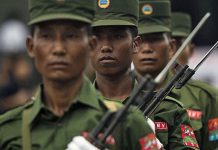
By BosNewsLife Asia Service
NEW DELHI, INDIA (BosNewsLife)– Human rights investigators have urged India’s government to tackle extremist groups and to improve protection of the country’s Christian minority after “the most severe anti-Christian violence seen in post-independence India,” which killed scores of people and displaced thousands, mainly in the states of Orissa and Karnataka.
In its annual briefing on the situation of Christians in India, Britain-based advocacy group Christian Solidarity Worldwide (CSW) said last year “saw a continued pattern of religiously-motivated violence perpetrated against the Christian community across numerous states.”
The briefing, seen by BosNewsLife Friday, March 27, noted that “the final third of 2008 saw the worst spate of ‘communal violence’ ever faced by the Christian community in post-independence India centred on Kandhamal district” of Orissa which soon spread to other areas.
CSW said the violence in Orissa was catalysed by the assassination of the local leader of a Hindu nationalist group, Vishwa Hindu Parishad (VHP), on August 23 by unknown assailants. The next day, “mobs were rampaging around the district, setting up roadblocks, shouting Hindu nationalist and anti-Christian slogans and openly blaming Christians for the killing of [Hindu leader] Saraswati and calling for revenge,” CSW added.
CHRISTIANS DENY
Christians denied involvement, and officials soon aknowledged that Maoist rebels claimed responsibility for the killing. Yet the anti-Christian violence continued and “resulted in the killing of 70” people with “over 50 others unaccounted for,” CSW said. At least 50,000 people were displaced, many of whom still live in refugee camps or outside their homes, according to rights investigators.
CSW noted that the clashes were characterized by “brutal violence and forcible conversions to Hinduism.” It said the roots of the conflict is “the systematic propagation of hatred and violence against Christians by proponents of ‘Hindutva’”, a term used to describe movements advocating Hindu nationalism.
“The most pressing concerns, as of January 2009, included the filing and proper investigation of cases by police, the delivery of compensation and addressing the humanitarian situation,” the group explained.
Religiously-motivated violence against Christians was also a problem in other states, including Karnataka, where CSW reported “an intense period of seemingly co-ordinated attacks on church targets between August-October 2008”. Most attacks were reported in coastal Dakshina Kannada district, while some incidents were noted in other areas of the coastal state. “Coastal Karnataka is reputed as an area in which Hindu nationalist organisations have been active for over fifteen years in propagating the ‘Hindutva’ agenda,” CSW said.
POLICE “COMPLICITY”
It condemned alleged police negligence “or complicity” in response to religiously-motivated violence in Karnataka and Orissa. Indian officials did not immediately react to the latest briefing, but the government has discussed the situation with church officials and rights groups.
CSW said it has urged Indian authorities to follow the recommondetions of the UN Special Rapporteur on freedom of religion or belief, who has raised concerns and recommended improving legislative protection for religous minorities.
The group added it was also concerned that Dalits, seen as the ‘lowest caste” in India’s ancient system of Hinduism, “lose their rights as ‘Scheduled Castes'” when converting to Christianity. The government has reserved working places and other benefits for Scheduled Castes as part of an effort to reduce cases of discrimination.
In addition, CSW expressed concerns over controversial ‘anti-conversion laws’, in seven states, which it said “pose a threat to freedom of religion through their restriction of religious conversions and their damaging normative effect on religious minorities.”
INTERNATIONAL CONCERN
Christian Solidarity Worldwide’s Chief Executive, Mervyn Thomas told BosNewsLife that “Rightly, there have been weighty international expressions of concern about anti-Christian violence in India, particularly in Orissa state…However, anti-Christian violence in India should be seen in light of the wider concerns about anti-conversion laws, religious discrimination against Dalit Christians and Muslims, and the powerful anti-minority discourse of the Hindu nationalist movement.”
Thomas said, CSW has “strongly” encouraged the Indian government “to tackle these concerns with a firm resolve, particularly by implementing the recommendations of the UN Special Rapporteur on freedom of religion or belief”.
Christians comprise just over two percent of India’s mainly Hindu population of over 1.1 billion people, according to the United States Central Intelligence Agency (CIA).








